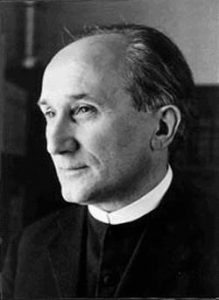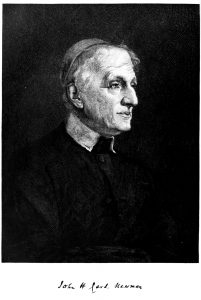“Everyone then who hears these words of mine and does them will be like a wise man who built his house on the rock. 25 And the rain fell, and the floods came, and the winds blew and beat on that house, but it did not fall, because it had been founded on the rock. 26 And everyone who hears these words of mine and does not do them will be like a foolish man who built his house on the sand. 27 And the rain fell, and the floods came, and the winds blew and beat against that house, and it fell, and great was the fall of it.” Mt 7:24-27

Romano Guardini
This year’s hurricanes make us look at the power of the storm and the grave impact it can have on our lives. It also reminds us of the reality of the storms in our culture, our world, and in our own hearts.
How do we build our lives on the rock instead of the shifting sands of the culture around us? How do we keep our compass straight in a world where “north” is declared “south” and even truths and teachings of the Church are skewed to fit peoples’ pet projects?
Msgr. Romano Guardini, the great twentieth century theologian, mentor to Pope Benedict XVI and prolific writer, prophetically summarized the danger of being lost in the modern world while he wrote about the importance of forming and living by a Catholic world view. If we don’t, he says,
“We find ourselves, first of all, with a tendency to consider the world —that is, the context of what can be immediately experienced— as the entirety of what is real and relevant, and proceed, exclusively from this presupposition, to respond to the problems of life”
Politics, terrorism, gender ideology, the economy, the media, jobs, decay of the family, school, work challenges, depression, ADHD, aging parents, addiction, failing health, technology and an ever-changing world with threats that reach us from thousands of miles away with one click. Not to mention the ever present media and the 24 hour news cycle. New agendas, marketing and cultural shifts pressure us daily to adjust our living and thinking. To live based in responses to these things is very much building a house on shifting sands.
Instead, all of these screaming realities that demand our reaction and fragment our peace become context instead of foundation when we choose to see the world through Christ’s eyes. They are properly seen as events and elements of our world that we can respond to wisely, instead of letting them reign as the domineering drivers of our thoughts, actions and reactions.
The antidote to modern frenetic group-think is to take a pause, know Christ and learn to see through his eyes, to shape ourselves with an integral Catholic formation and to act from that as our solid rock, as a simple, peaceful and strong sign of contradiction in this domineering culture. This is a Catholic worldview.
Guardini rooted all of this in adoration of the Blessed Sacrament as the healing and blessed experience of Christ where
“…things fall into true perspective. Vision sharpens. Much that troubles us rights itself.”
He brought that experience of prayer and closeness to Our Lord into concrete life by insisting on the sacredness of human beings even in the midst of their annoying or even catastrophic cruelties to each other. That means the person who disagrees with you on Facebook, the adolescent obsessed with how many likes their picture got, the politician who threatens all you hold dear, the spouse who irritates, the neighbor who annoys, the person who disappoints you and the expectations you have of them.
The view we have of them, our thoughts towards them and our course of action stem from this reality instead of from a transient response to something they have done- positive or negative.
This doesn’t make life easy. But it makes it peaceful. Our world is not perfect. It won’t be perfect. But it must be redeemed. Redemption can be in fact, a more beautiful perfection than something that looks the way we wanted it to from the very beginning. That’s the mystery of the cross. That’s the source of mercy. And redemption happens one person at a time.
What about the war between Mercy and Truth?
Approaching the cross of our Savior, we see they are not at odds. God knows the truth about us, about our strengths, victories, weaknesses and failures, and he chose mercy to satisfy justice. He asks us to take up our own cross and do the same.
This means we see the bright and dark realities around us with clarity, and in respecting the demands of justice, we work for what is good true and beautiful, but we ultimately see our own inabilities and failures too. We offer this as our cross and ask Christ to live in us, to bring redeeming mercy into the situation and then believe in his ability to triumph over sin and death. Not as the vindictive king the Pharisees imagined, but as the Lord who reigns with open wounds so that we are not afraid to approach him with ours.
So that we walk with others in a broken world to help them approach him with their wounds and know they will find a savior who has indeed judged them… and found them worthy of His death and eternal love.
 Truth speaks softly, but with authority
Truth speaks softly, but with authority
The Christian reality of mercy is so counter-cultural that it is disarming. Love strikes the core of the human person and they cannot stop it. That’s what gave Mother Teresa her quiet but unshakeable power to bring the true, good and beautiful to light in the darkest places and people. In a time when she and her fellow nuns and volunteers who world with them were being persecuted by Indian government and culture, she wrote to them, quoting Cardinal Newman:
Let us preach the peace of Christ like he did. He went about doing good; he did not stop his works of charity because the Pharisees and others hated him or tried to spoil his Father’s work. He just went about doing good.
Cardinal Newman wrote: ‘Help me to spread thy fragrance everywhere I go—let me preach thee without preaching, not by words but by my example—by the catching force; the sympathetic influence of what I do, the evident fullness of the love my heart bears to thee.’ Our works of love are nothing but works of peace. Let us do them with greater love and efficiency—each in her own or his own work in daily life; in your home—in your neighbour. It is always the same Christ who says:
I was hungry—not only for food, but for peace that comes from a pure heart.
I was thirsty—not for water, but for peace that satiates the passionate thirst of passion for war.
I was naked—not for clothes, but for that beautiful dignity of men and women for their bodies.
I was homeless—not for a shelter made of bricks, but for a heart that understands, that covers, that loves.
This year let us be this to Christ in our neighbor.
Once Christian truth is understood as stemming from a Person, not a set of arbitrary laws, it becomes attractive.
 Discovering Truth, discovering Church teaching and tradition, should be like deepening a love relationship with a person. Getting to know them. Listening to them, understanding them and why they are who they are, why they do what they do. To enter into that world and make it my own. To act as a citizen of that world even while I live here. Living that truth concretely and introducing others to the one who loves them is the foundation for our action in a confused world. That’s evangelization.
Discovering Truth, discovering Church teaching and tradition, should be like deepening a love relationship with a person. Getting to know them. Listening to them, understanding them and why they are who they are, why they do what they do. To enter into that world and make it my own. To act as a citizen of that world even while I live here. Living that truth concretely and introducing others to the one who loves them is the foundation for our action in a confused world. That’s evangelization.
“What is the Church?” Guardini asks. And he answers, “It is the kingdom of God.”
The Kingdom is not of this world. So as citizens of the Kingdom, members of the church, we can have both a detached peace about the events of this life and a passionate desire to bring the Kingdom to others and to bring others into the Kingdom. This is where the Catholic’s peace and passion find their source and what motivates our action for good as well as our peace in the midst of suffering.
Being a compass in a lost world
“A faith that does not run from doubt—hence, a faith that remains authentic—does not distance itself from questions, but includes them. As Cardinal Newman has said, ‘faith is able to bear doubt.’” – Romano Guardini
This is where we meet others. We’re not afraid of their doubts, of the thoughts and actions that those doubts have driven. We have no fear in meeting them in their world view, and simply bringing Christ’s gaze there. His joy, his peace, his love, his truth, lived in me. It’s him who will transform them, not me. More often than not what we actually find on arrival in the life of someone else we have come to serve is that Christ was present there long before we entered into the picture. And while we can help them see his presence, we are often ministered to by Him living in them, at the same time. This is how the kingdom grows.
We can be a compass for them by our example. First, though, we need to make sure our compass is properly aligned.
